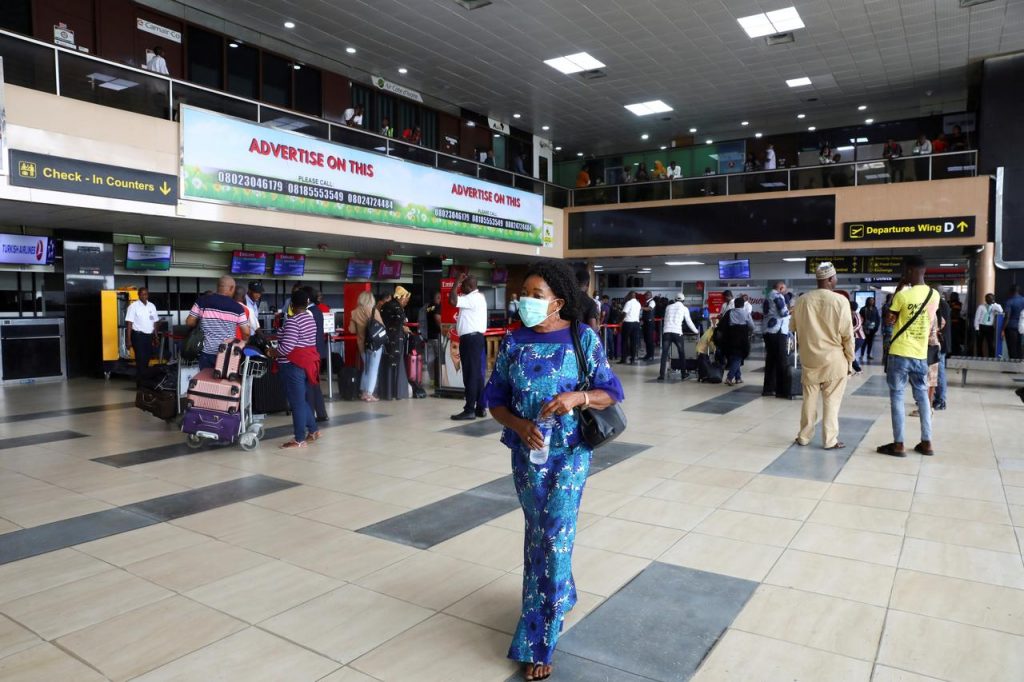24,823 people were tested across the NCDC-certified testing centers in the country over the past week. This is an increase from the 17,730 people that were tested in the week before that.
3,361 new cases were discovered indicating an infection rate of 13.53%. With last week’s infection rate at 13.73%, it means that the rate of infection was only slightly lower for this week.
International flights to resume in Nigeria


The ban on international flights was lifted this week as international flights were scheduled to resume on August 19. Lagos and Abuja international airports will start operations at the moment while others will resume later. For people returning to the country as well as those travelling out, there are guidelines that have been laid down to mitigate the spread of the COVID-19.
For returning travellers
Travellers returning to the country are required to subject themselves to COVID-19 test before onboarding any plane coming into the country. Upon landing in Nigeria, they will be required to take another test after 8 days to find out if they are infected or not. The payment for the test will be made through a portal that will be created by the Aviation ministry.
The passengers will be required to fill an online form with responses about their health, print and deliver it to the Airport authorities as they enter the country.
For people travelling from Nigeria
The regulation says that travellers are required to wear a face mask and get to the airport 3 hours before they are scheduled to board. Checking of temperature, social distancing, and frequent sanitising of hands will also be enforced within the airport. Travellers will be given hand sanitizers before they board the plane.
Escorts and others not travelling will not be allowed into the airport terminal while those who come to pick up passengers are advised to stay in their cars and wait for the new arrivals to leave the gate.
The airports will put place markers and protective barriers between counter operators and passengers in place while airline agents will be on ground to make sure the guidelines are adhered to.
Ministry of Education announces guidelines for reopening of schools
Concern about the spread of the COVID-19 has continued to characterize the responses of stakeholders in Nigeria’s educational sector as schools prepare to reopen. The minister for education has therefore released guidelines for the reopening of schools in the country.
The schools are required to train staff on safety and hygiene measures, particularly in response to COVID-19. In addition, they are required to have access to testing/isolation/treatment centers including the NCDC helpline and state government health facilities.
Schools will also be required to have a COVID-19 referral system in place as well as reduce the number of students in hostels, classrooms, and places of worship. Schools that use their buildings for other events such as voting centers, temporary shelters and others have to review their policies and establish protocols that will ensure that the health of those people is not endangered.
Schools that are unable to comply with the guidelines are advised to consider the online learning option. This option has guidelines as well which include appropriate training of the teachers on using 21st-century technology to teach online.
The schools are required to grant access to online training materials, learning platforms as well as radio or TV programs to the students who will be learning remotely.
Mutant strain of COVID-19 found in Malaysia
A new strain of the COVID-19 has been discovered in Malaysia. According to experts, this mutant strain is ten times more infectious than the regular one which the world is battling currently. The disclosure was made by Malaysia’s Director-General of the Health Ministry, Noor Abdullah.
The new strain which is called D614G has been found in 3 out of 45 Coronavirus cases that were traced back to a male restaurant owner. He had returned from India and failed to complete the mandatory 14-day quarantine before mixing with people in Malaysia. He has since been fined and sentenced to 5 months imprisonment.
The strain was also found in another cluster involving people that returned from the Philippines. While the strain has not been proven to cause more severe ailments than the current strain, the ease of spreading makes it harder to control than the current strain.
The new strain was detected by the Malaysian Institute of Medical Research after isolating and carrying out culture tests on 3 cases from the country’s Sivaganga cluster and one case from the Ulu Tiram cluster.
A press report by the WHO disclosed that the strain is not likely to have any significant effect on the efficacy of vaccines being developed for the current strain. However, the mutation has become the predominant variant in Europe and the United States.
COVID-19 is moving to rural areas with lesser population in Africa
The exponential rate of infection for the COVID-19 has been slower in Africa than in other parts of the world, according to the WHO. The health organization says the virus is now moving from high-density urban areas to informal settlements and rural areas with lower population.
According to WHO Regional Director for Africa, Dr Matshidiso Moeti “Preliminary analysis by WHO finds that an exponential surge in cases which peak about two to three weeks later is not occurring in Africa.”
“Instead, many countries are experiencing a gradual rise in COVID-19 cases and it is difficult to discern a specific peak. Transmission patterns also differ between countries, but more importantly within countries. At the onset, COVID-19 mainly affected capital cities. However, the virus is now moving from high-density urban areas to informal settlements and then onward to rural areas that have a lower population density.’’
This consequently means that COVID-19 prevention and responses at the community levels have to be strengthened to combat the spread there.
Slum2School receives $100,000 donation from Prudence Foundation


Prudence Foundation, the community investment arm of Prudential Plc in Asia and Africa, has donated the sum of $100,000 to Slum2School. The donation is to help Slum2School continue its work of providing education to people in disadvantaged communities in Nigeria to help fight the harsh impacts of the COVID-19 on education in the communities.
Using the funds, Slum2School will obtain 300 tablets with internet connections, 34 laptops for Slum2School facilitators, 34 whiteboards, markers and board eraser sets, state-of-the-art learning studio for 50-90 pupils per session, stationery for students, and learning programs and software.
Besides the cash donation, the foundation donated foodstuffs to the less-privileged families identified within the communities.






